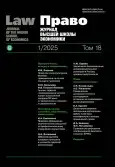Wage Security in Hybrid Legal Regimes
- Authors: Chucha S.1
-
Affiliations:
- Institute of State and Law, Russian Academy of Sciences
- Issue: Vol 18, No 1 (2025)
- Pages: 280-296
- Section: Review
- URL: https://bakhtiniada.ru/2072-8166/article/view/292815
- DOI: https://doi.org/10.17323/2072-8166.2025.1.280.296
- ID: 292815
Cite item
Full Text
Abstract
About the authors
S. Chucha
Institute of State and Law, Russian Academy of Sciences
Email: chuchaigpan@gmail.com
ORCID iD: 0000-0001-5771-6323
References
- Filipova I.A. (2021) The impact of digital technologies on labor: guidelines for labor law. Nizhny Novgorod: University Press, 106 p. (in Russ.)
- Filipova I.A. (2020) Labor law: challenges of the information society. Pravo. Zhurnal Vysshey shkoly ekonomiki=Law. Journal of the Higher School of Economics, no. 2, pp. 162-182 (in Russ.)
- Gabov A.V. (2021) Digital ruble of the Central Bank as an object of civil rights. Aktual'nyye problemy rossiyskogo prava=Issues of Russian Law, no. 4, pp. 55-65 (in Russ.)
- Ivanov S.A. et al. (1974) Labor law and technological progress. Moscow: Nauka, 563 p. (in Russ.)
- Ivanov S.A. et al. (1972) Labor law and increasing the efficiency of social production. Moscow: Nauka, 422 p. (in Russ.)
- Ivanov S.A., Livshits R.Z., Orlovsky Yu.P. (1978) Soviet labor law: theoretical issues. Moscow: Nauka, 368 p. (in Russ.)
- Kartashova G.N. (2022) Changing legislation on the labor of minors. In: Transformation of labor law in the post-industrial information society: papers of international conference. Moscow: Institute of State and Law, pp. 78-92 (in Russ.)
- Laptev V.A. (2023) Head of organization and body of a legal entity: unity of essence and contradictions. Vestnik Permskogo universiteta. Yuridicheskiye nauki=Bulletin of Perm University. Legal sciences, no. 2, pp. 285-311 (in Russ.)
- Livshits R.Z. (1972) Wages in the USSR: legal study. Moscow: Nauka, 270 p. (in Russ.)
- Muzyka M.V. (2024) Digital ruble among forms of remuneration: problems and prospects of use. Trudovoye pravo v Rossii i za rubezhom=Labor Law in Russia and abroad, no. 3, pp. 29-31 (in Russ.)
- Petrov A.Ya. (2024) Guarantees and compensations: history, theory, law: textbook. Moscow: Prospect, 552 p. (in Russ.)
- Petrov A.Ya. (2014) Labor and vocational training contracts: textbook. Moscow: Prospect, 352 p. (in Russ.)
- Petrov A.Ya. (2011) Wages: issues of labor law: manual. Moscow: EKONIS, 308 p. (in Russ.)
- Petrov A.Ya. (2024) Wages in Russia: history, theory, law. Moscow: Prospect, 400 p. (in Russ.)
- Petrov A.Ya. (2022) Social partnership in the sphere of labor: history, theory, law: textbook. Moscow: Yurait. 348 p. (in Russ.)
- Ryabova E.V., Machekhin V.A. (2022) Taxation of the self-employed in Russia: potential discrimination. Pravo. Zhurnal Vysshey shkoly ekonomiki=Law. Journal of the Higher School of Economics, vol. 15, no. 3, pp. 149-172 (in English)
- Salikova N.M. (2003) Remuneration of labor in the Russian Federation. Legal study. Ekaterinburg: Ural State Law Academy, 354 p. (in Russ.)
- Savenkov A.N., Kambolov M.A., Drozdov I.A. et al. (2024) Interdisciplinary protection of labor and social rights in the context of social transformation. Moscow: Institute of State and Law, 573 p. (in Russ.)
- Sitnik A.A. (2023) Digital ruble as object of regulation. Aktual'nyye problemy rossiyskogo prava=Issues of Russian law, no. 8, pp. 20-36 (in Russ.)
- Tal L.S. (1913) Labor contract: civilian study. Yaroslavl: Governor‘s Printing Office, 539 p. (in Russ.)
- Zakalyuzhnaya N.V. (2023) A concept of employment and development of labor relations in the digital age. Pravo. Zhurnal Vysshey shkoly ekonomiki=Law. Journal of the Higher School of Economics, vol. 16, no. 2, pp. 139-164 (in Russ.)
Supplementary files








